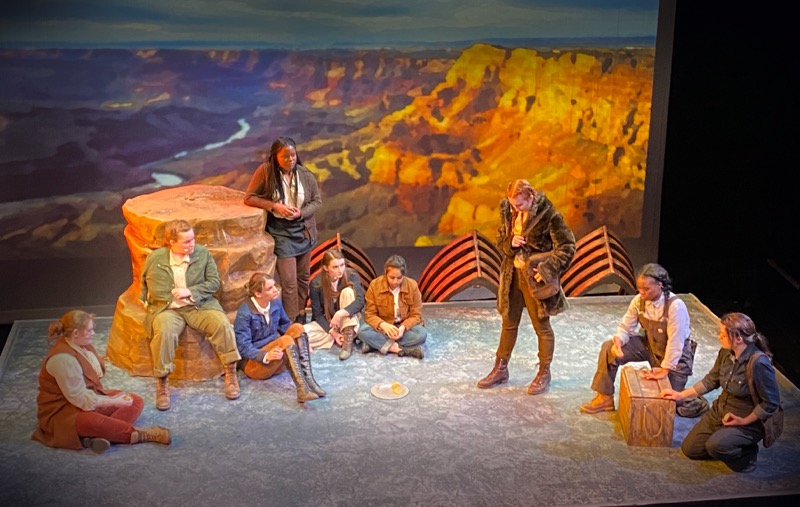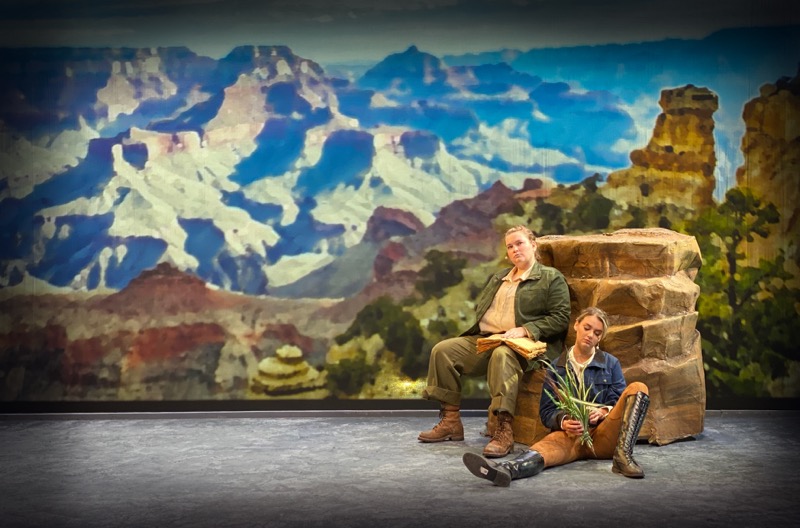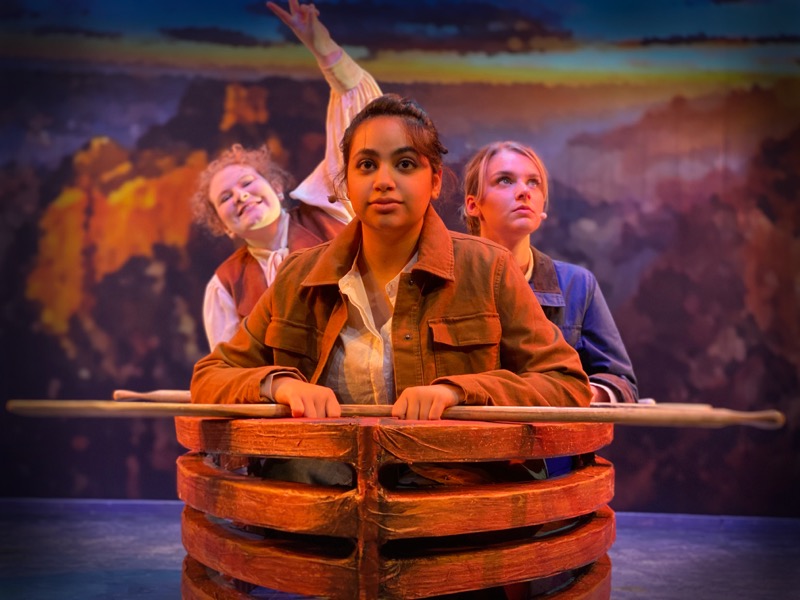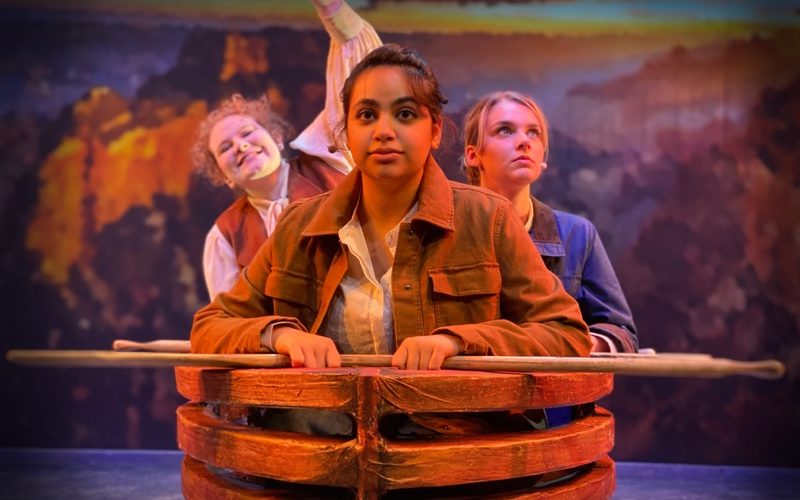LARA JO HIGHTOWER/Special to the Free Weekly
The first thing you need to know about the University Theatre’s production of “Men on Boats” is that it’s equal parts comedy and adventure. Jaclyn Backhaus’ play tells the “true(ish)” story of an 1869 expedition to chart the course of the Colorado River in the shadow of the Grand Canyon and is heavily based on the journals of explorer John Wesley Powell.
The second thing you need to know is that, in a clever gender swap, the men on boats are actually women — the playwright’s way of encouraging the audience to see the story through a different lens.

“The playwright thought, ‘This is an amazing story that should be told,’” says director Morgan Hicks . “‘But I don’t want to write another play about men and their experiences.’ So she was grappling with that and thought, ‘Why does it have to be male actors telling the story? Why couldn’t it be female actors telling an adventure story?’ And it really did pull the whole story apart, because it’s sort of centering people that would have never been invited on that trip, that would never have had the opportunity to have that adventure. It kind of re-frames and re-centers and asks a lot of different questions rather than just telling the story straightforwardly with the typical, predictable actors in place.”
And, according to a 2015 New York Times review of an Off Off Broadway production of the play, it works:
“Yet it’s hard to imagine this 90-minute account of a pioneering journey through virgin Western territory in 1869 being nearly as effective, or entertaining, with an ensemble of men … ‘Men on Boats’ makes canny use of the obvious distance between performers and their roles to help bridge the distance between then and now. You see, imagining life in another, distant time always requires a leap of faith. The past has its own language, customs and sense of the human place in the world. Whenever screen and stage artists try to summon what life must have been like long ago, we’re too often conscious of jarring inconsistencies, of the anachronisms that are allowed to slip in. ‘Men on Boats’ starts from the realization that we can never re-create exactly how it was. This play’s perspective is that of a contemporary reader filtering accounts of another age through her own latter-day sensibility.”
The production history of the show has been full of peaks and valleys, to say the least. First scheduled for fall 2020, it was indefinitely postponed as the UA Department of Theatre navigated the unpredictable waters of a global pandemic. The department considered postponing it until fall 2021, but instead decided to present it as a virtual Zoom performance this month — a disappointing, if necessary, covid-19 pivot. But once in rehearsal, says Hicks, the production team realized that all cast members had received at least their first vaccinations. If they were careful and quarantined in a bubble, the cast could actually perform together on stage as the show was filmed for audiences to stream at home. But that meant mastering the art of filming a stage production with multiple cameras — in a very short span of time.

“I feel like we, as theater people, are cravers of chaos,” says Hicks with a laugh. She credits graduate student Amanda Warren as the person who figured out how to use Open Broadcaster Software to film with multiple cameras from different angles. “If we were into routine and feeling very comfortable all the time, we would never do this kind of work. Every production is going to be like learning a million new things at once, so that’s where our brain goes. And we’ve had a little bit of a dip this year, so it was really exciting to jump back in and figure things out.”
Hicks says the cast and production team were overjoyed to be working in person in a theater again after a year of canceled shows. For theater students, missing out on the practical application of your craft — performing in front of an audience — has made for a heartbreaking and frustrating year.
“It’s been a hard time for them,” says Hicks. “We’ve had some virtual productions that were really great opportunities for the students to explore roles, do analysis, do research and do all of those things. But it wasn’t quite the same. Acting with somebody on Zoom, when you can’t make eye contact with them, when you’re not in the same space with them, is different. Most of our rehearsals for this show were on Zoom. When we got into the space, and the actors could actually see one another, when they could touch one another, that’s when I think they realized how much they had been missing. And so it was sort of a bittersweet night of saying, ‘Oh, how happy we are to be together,’ but, also, kind of grieving what we’ve been missing at the same time.”

“Acting and performing for classes in front of my laptop proved to be difficult,” says “Men on Boats” cast member Chloe Haroldson. “When we figured out how to do this show, it was initially going to be over Zoom. Then, through vaccinations, testing and safety measures, we got to come together to film and perform this show on an actual stage. Looking, touching, breathing the same air as everyone who worked so hard on this project!
“Acting is about ‘living truthfully under imaginary circumstances,’ as we’re taught here at the UA. I had to learn how to act in imaginary worlds in my bedroom this year. Finally, I once again got to be in an imaginary world in-person. … This is, by far, one of the most meaningful productions I’ve ever done. Here’s to all of us actors hopefully soon getting to go back to the stage, the studios and picking up from where we left off. Here’s to all the future stories we get to tell.”
FAQ
‘Men on Boats’
WHERE — Streaming at uark.universitytickets.com
WHEN — 7:30 p.m. April 16-17 & April 21-24 and 2 p.m. April 18 & April 25
COST — Free
INFO — uark.universitytickets.com










